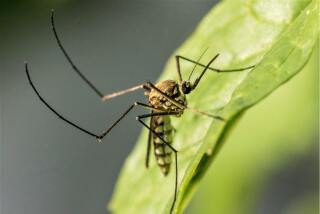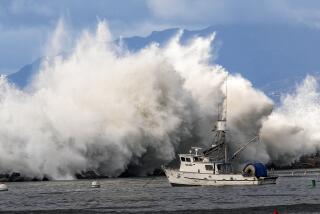Many Suffer an Allergic Reaction to El Nino
- Share via
Doctors had predicted that this year’s record-breaking rain would be especially harsh on people with allergies and asthma.
They warned that the unrelenting El Nino-generated storms would trigger a tempest of a different sort in the nasal passages of countless unfortunate allergic souls.
Still, some Ventura County allergy sufferers were not prepared for the severe health problems they are now enduring. They say they live in constant agony, triggered by a skyrocketing rise in airborne pollen and mold spores.
“I feel absolutely miserable,” Jackie McCauley said as a needle filled with an allergenic extract mixture was poked into her arm.
“I’m usually a tough cookie, but I have not stopped coughing and sneezing since the last rain,” said the Ventura woman, 40. “I have runny eyes, a stuffy nose, and even my voice is hoarse.”
With nearly 20 inches of rain, the County experienced its wettest February on record, meteorologists say. The moisture creates ideal growing conditions for mold and pollen--a microscopic powdery substance produced by some plants.
The immune systems in some people react, causing respiratory congestion and inflammation of their nasal passages and bronchial tubes.
Doctors in Ventura said the allergy season, which normally peaks in April, has hit earlier and more furiously this year. The last torrential rains resulted in an influx of patients seeking treatment for allergies and asthma, they said.
Local pharmacists reported a hike in over-the-counter sales of antihistamines and anti-inflammatory nasal sprays. At Ema’s Herbs in Ventura, the tea mixture of elecampane, yarrow and coltsfood leaves meant to relieve allergies was sold out. Owner Ema Omanovic said she was preparing a new batch.
There is one positive upshot to all of this.
“What we are seeing this year is a good season for allergists,” joked Dr. Chris Landon, a pediatrician and allergy specialist. “I’m still driving the red Mercedes I bought after the 1983 El Nino storms.”
Landon acknowledged that for some patients the matter is serious. Some allergy sufferers have been hospitalized after developing life-threatening symptoms.
In the past few weeks, Dr. Kathy McCourt has hospitalized four patients who were suffering from acute respiratory distress.
One was 12-year-old Daniela Metal of Ventura, whose asthma and allergies landed her in St. John’s Regional Center last Monday.
Daniela--normally an active, healthy student on the swim team at Cabrillo Middle School--reclined on her hospital bed Tuesday night playing Nintendo and nibbling on a meal of meatloaf and mashed potatoes.
Her mother, Gloria, sitting on the edge of the bed, had not left her daughter’s side since Daniela was admitted.
El Nino has swiped two precious weeks of school from Daniela, forced to stay in bed even before she entered the hospital.
“How I’m feeling really depends on the conditions of the environment,” Daniela said. “I can take my medication consistently and on time. But if I do the same thing and then we have the El Nino conditions, then I might end up in the hospital.”
Daniela’s concerns were shared by other local children.
Ten-year-old Pete Mendez and his sister Nellie, 8, who live in Oxnard, have missed several days at Cesar Chavez School since the February downpours. Their mother, Cindy, 36, who also suffers from allergies and asthma, joins her children in a nightly ritual of breathing antihistamines from inhalers. Nellie has broken out in rashes and must slather her skin in cortisone.
“A lot of people don’t understand when I have to call in sick at work,” Cindy Mendez said. “They think it’s an excuse. I guess you have to have asthma and allergies to know how serious it really is.”
In addition to medication, many preventive measures can fend off wheezing, sneezing and itching during and after rainy weather.
Dr. Arthur Peters, an ears, nose and throat specialist, gives some common-sense advice: Avoid hiking, and wear a mask when mowing the lawn.
Other suggestions include avoiding exercise early in the morning when pollen counts are highest and keeping windows closed at night. The American Lung Assn. offers classes that teach people to deal with asthma.
But Daniela’s concerns go a step further.
“Now I’m worried about La Nina,” she said. “That’s the drought we’re supposed to have after El Nino. What’s that going to do?”
More to Read
Sign up for Essential California
The most important California stories and recommendations in your inbox every morning.
You may occasionally receive promotional content from the Los Angeles Times.










